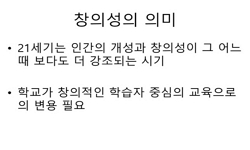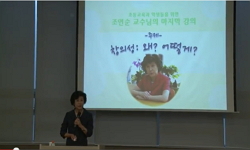This study seeks to explore how non-face-to-face creativity education at universities influences learners' creative self-efficacy. As society, as a whole, changed in response to COVID-19, the education community began to shift to non-face-to-face meth...
http://chineseinput.net/에서 pinyin(병음)방식으로 중국어를 변환할 수 있습니다.
변환된 중국어를 복사하여 사용하시면 됩니다.
- 中文 을 입력하시려면 zhongwen을 입력하시고 space를누르시면됩니다.
- 北京 을 입력하시려면 beijing을 입력하시고 space를 누르시면 됩니다.

COVID-19로 인한 비대면 창의성 계발 수업의 창의적 자기효능감 변화와 대면 수업과의 차이 탐색 = Exploring the Change in Creative Self-Efficacy of Non-Face-to-Face Creativity Classes after the COVID-19 Crisis as Compared to Face-to-Face Classes
한글로보기https://www.riss.kr/link?id=A107881985
- 저자
- 발행기관
- 학술지명
- 권호사항
-
발행연도
2021
-
작성언어
-
- 주제어
-
KDC
600
-
등재정보
KCI등재
-
자료형태
학술저널
-
수록면
57-78(22쪽)
-
KCI 피인용횟수
0
- 제공처
-
0
상세조회 -
0
다운로드
부가정보
다국어 초록 (Multilingual Abstract)
This study seeks to explore how non-face-to-face creativity education at universities influences learners' creative self-efficacy. As society, as a whole, changed in response to COVID-19, the education community began to shift to non-face-to-face methods, but various concerns and problems were faced. Unfortunately, the unprecedented crisis is continuing, and the possibility of another crisis cannot be ruled out. Accordingly, the aim of this study is to identify examples, processes, and effects of non-face-to-face creativity education that can respond to crises and is sustainable, as well as to propose potential solutions. To attain this objective, a total of 473 students at C University in Seoul, including 194 students who participated in face-to-face classes and 279 students who participated in non-face-to-face classes, were studied to measure their creative self-efficacy before and after the classes. A response sample t-test was conducted for the analysis of in-group effectiveness, while an independent sample t-test was used to determine whether there were significant differences between groups. The subfactors of creative self-efficacy, namely self-efficacy in creative thinking and self-efficacy in creative performance, were also examined in all processes. The results of the study are as follows. First, in both face-to-face and non-face-to-face groups, creative self-efficacy based on creativity classes, as well as its sub-factors, showed significant increases. Second, there was no statistically significant difference in creative self-efficacy and its subfactors between face-to-face and non-face-to-face groups following the creativity classes. The study demonstrated that even if the creativity classes are conducted in a non-face-to-face environment, they could be as effective as face-to-face classes, which suggests that non-face-to-face classes may have potential for creativity education.
참고문헌 (Reference)
1 박종철, "호텔기업 직원의 창의적 성향을 기반으로 한 창의적 자기효능감이창의적 사고 및 성과에 미치는 영향" 한국호텔외식관광경영학회 26 (26): 157-175, 2017
2 정희연, "한국어 온라인 동영상 수업에 대한 학습자 인식 조사 연구" 사단법인 아시아문화학술원 11 (11): 1305-1318, 2020
3 이용상, "코로나19로 인한 언택트 시대의 온라인 교육 실태 연구" 한국교육과정평가원 23 (23): 39-57, 2020
4 도성훈, "코로나19 이후, 인천미래교육에 대한 질문과 상상" 7-17, 2020
5 정향기, "코로나19 상황의 대학교육에 있어서 전면적 온라인 수업 실행 및 평가에 대한 학습자 만족도" 한국멀티미디어언어교육학회 23 (23): 392-412, 2020
6 이보경, "코로나 19로 인한 비대면 교양영어 수업의 학습자 반응에 관한 연구" 한국교양교육학회 14 (14): 97-112, 2020
7 Bandura, A, "자기효능감과 삶의 질: 교육․건강․운동․조직에서의 성취" 교육과학사 2007
8 최민지, "예술창작활동이 창의적 자기효능감에 미치는 영향: C대학 교양수업 사례를 중심으로" 학습자중심교과교육학회 17 (17): 165-190, 2017
9 이상민, "예비 초등교사 대상 온라인 미술교육 방안 연구" 초등교육연구원 31 (31): 181-204, 2020
10 송수연, "언택트 시대의 대학교육: 코로나19에 따른 비대면 강의 만족도와 수강지속 의사에 영향을 미치는 요인에 관한 연구" 교육연구소 21 (21): 1099-1126, 2020
1 박종철, "호텔기업 직원의 창의적 성향을 기반으로 한 창의적 자기효능감이창의적 사고 및 성과에 미치는 영향" 한국호텔외식관광경영학회 26 (26): 157-175, 2017
2 정희연, "한국어 온라인 동영상 수업에 대한 학습자 인식 조사 연구" 사단법인 아시아문화학술원 11 (11): 1305-1318, 2020
3 이용상, "코로나19로 인한 언택트 시대의 온라인 교육 실태 연구" 한국교육과정평가원 23 (23): 39-57, 2020
4 도성훈, "코로나19 이후, 인천미래교육에 대한 질문과 상상" 7-17, 2020
5 정향기, "코로나19 상황의 대학교육에 있어서 전면적 온라인 수업 실행 및 평가에 대한 학습자 만족도" 한국멀티미디어언어교육학회 23 (23): 392-412, 2020
6 이보경, "코로나 19로 인한 비대면 교양영어 수업의 학습자 반응에 관한 연구" 한국교양교육학회 14 (14): 97-112, 2020
7 Bandura, A, "자기효능감과 삶의 질: 교육․건강․운동․조직에서의 성취" 교육과학사 2007
8 최민지, "예술창작활동이 창의적 자기효능감에 미치는 영향: C대학 교양수업 사례를 중심으로" 학습자중심교과교육학회 17 (17): 165-190, 2017
9 이상민, "예비 초등교사 대상 온라인 미술교육 방안 연구" 초등교육연구원 31 (31): 181-204, 2020
10 송수연, "언택트 시대의 대학교육: 코로나19에 따른 비대면 강의 만족도와 수강지속 의사에 영향을 미치는 요인에 관한 연구" 교육연구소 21 (21): 1099-1126, 2020
11 이영란, "언론 기사를 통해 본 포스트 코로나 시대 교육의 방향성: 위기 속 ‘창의성 교육’의 역할" 한국창의력교육학회 20 (20): 65-85, 2020
12 정정훈, "비대면 대학 교육과정과 수업에 대한 통합적 연구" 한국질적탐구학회 7 (7): 171-204, 2021
13 Bandura, A, "변화하는 사회 속에서의 자기효능감" 학지사 2004
14 도재우, "면대면 수업의 온라인 수업 전환과정에서 발생하는 설계 장애물에 대한 탐색" 교육연구소 26 (26): 153-173, 2020
15 김영희, "대학생의 COVID - 19로 인한 온라인 학업 경험" 한국산학기술학회 21 (21): 278-290, 2020
16 하유경, "대학생용 창의적 자기효능감 척도의 개발과 타당화" 한국심리학회산하학교심리학회 13 (13): 55-78, 2016
17 Moreno, J. L., "The third psychiatric revolution and the scope of psychodrama" 17 : 149-171, 1964
18 Puente-Díaz, R., "The role of creativity in the management of innovation" World Scientific 149-158, 2017
19 Tierney, P., "The pygmalion process and employee creativity" 30 (30): 413-432, 2004
20 Zeng, W., "The influence of post-traumatic growth on college students’ creativity during the COVID-19 pandemic : The mediating role of general self-efficacy and the moderating role of deliberate rumination" 12 : 1264-, 2021
21 Schleicher, A, "The impact of COVID-19 on education: Insights from education at a glance 2020" OECD 2021
22 Shalley, C. E., "The effects of personal and contextual characteristics on creativity : Where should we go from here?" 30 (30): 933-958, 2004
23 Newman, A., "The effects of employees' creative self-efficacy on innovative behavior : The role of entrepreneurial leadership" 89 : 1-9, 2018
24 Cropley, A. J., "The dark side of creativity" Cambridge University Press 297-315, 2008
25 Moreno, J. L., "Spontaneity theory of child development" 7 (7): 89-128, 1944
26 Patston, T. J., "Secondary education in COVID lockdown : More anxious and less creative-maybe not?" 12 : 391-, 2021
27 Azoulay, A, "On the occasion of the international day of education" UNESCO
28 Beghetto, R. A., "Nurturing creativity in the classroom" Cambridge University Press 191-205, 2010
29 Bandura, A., "Negative self-efficacy and goal effects revisited" 88 (88): 87-, 2003
30 Kapoor, H., "Meaning-making through creativity during COVID-19" 11 : 3659-, 2020
31 Karwowski, M., "It doesn't hurt to ask...but sometimes it hurts to believe: Polish students' creative self‐efficacy and its predictors" 5 : 154-164, 2011
32 Karwowski, M., "How to develop creative imagination? : Assumptions, aims and effectiveness of role play training in creativity" 3 (3): 163-171, 2008
33 Beghetto, R. A., "How times of crisis serve as a catalyst for creative action: an agentic perspective" 11 : 3735-, 2021
34 UNESCO, "Global Education Coalition" UNESCO
35 Vincent-Lancrin, S., "Fostering students’ creativity and critical thinking: What it means in school" OECD 2021
36 Jaiswal, N. K., "Fostering employee creativity through transformational leadership : Moderating role of creative self-efficacy" 28 (28): 367-371, 2016
37 Meinel, M., "Exploring the effects of creativity training on creative performance and creative self-efficacy : Evidence from a longitudinal study" 53 (53): 546-558, 2018
38 Byrge, C., "Embodied creativity training : Effects on creative self-efficacy and creative production" 16 : 51-61, 2015
39 UNESCO, "Distance Learning Solutions" UNESCO
40 Runco, M. A., "Creativity: Theories and themes, research, development, and practice" Elsevier 2014
41 Beghetto, R. A., "Creativity under duress in education?" Springer 27-40, 2019
42 Karwowski, M., "Creativity and reason in cognitive development" Cambridge University Press 302-326, 2016
43 Gajda, A., "Creativity and academic achievement : A meta-analysis" 109 (109): 269-299, 2017
44 Beghetto, R. A., "Creative self-efficacy, correlates in middle & secondary students" 18 (18): 447-457, 2006
45 Tierney, P., "Creative self-efficacy development and creative performance over time" 96 : 277-293, 2011
46 Richter, A. W., "Creative self-efficacy and individual creativity in team contexts : Cross-level interactions with team informational resources" 97 (97): 1282-1290, 2012
47 Tierney, P., "Creative self-efficacy : Its potential antecedents and relationship to creative performance" 45 : 1137-1148, 2002
48 Mathisen, G. E., "Creative self-efficacy : An intervention study" 48 : 21-29, 2009
49 Puente-Díaz, R., "Creative self-efficacy : An exploration of its antecedents, consequences and applied implications" 150 : 175-195, 2016
50 Orkibi, H., "Creative adaptability : Conceptual framework, measurement, and outcomes in times of crisis" 11 : 3695-, 2021
51 Beghetto, R. A., "Classroom contexts for creativity" 25 : 53-69, 2014
52 Kupers, E., "Children’s creativity : A theoretical framework and systematic review" 89 (89): 93-124, 2019
53 Mercier, M., "COVID-19 : A boon or a bane for creativity?" 11 : 3916-, 2021
54 Kaufman, J. C., "Beyond big and little : The four c model of creativity" 13 (13): 1-12, 2009
55 Beghetto, R. A., "Answering the unexpected questions: Exploring the relationship between students' creative self-efficacy and teacher ratings of creativity" 5 (5): 342-349, 2011
56 Tang, M., "An interdisciplinary and intercultural approach to creativity and innovation : Evaluation of the EMCI ERASMUS intensive program" 24 : 268-278, 2017
57 Puente-Díaz, R., "An exploration of some antecedents and consequences of creative self-efficacy among college students" 52 (52): 256-266, 2018
58 Cohen, L. M., "Adaptation and creativity in cultural context" 30 (30): 3-18, 2012
59 OECD, "A Framework to Guide an Education Response to the COVID-19 Pandemic of 2020" OECD
동일학술지(권/호) 다른 논문
-
미술관 전시물을 활용한 집단미술치료가 아동의 문제행동, 미술에 대한 태도에 미치는 효과
- 한국예술교육학회
- 조연경 ( Cho Yeon-kyung )
- 2021
- KCI등재
-
『존경하는 엘레나 선생님』의 엘레나 세르게예브나 역할창조 방법 연구
- 한국예술교육학회
- 문선영 ( Moon Seon-yeong )
- 2021
- KCI등재
-
공연 텍스트(Performance Text) 창작과정 연구 : 국제공동제작 프로젝트 『보더라인』의 상호텍스트성을 중심으로
- 한국예술교육학회
- 이경성 ( Lee Kyung-sung )
- 2021
- KCI등재
-
텍스트 마이닝을 통한 리터러시 융합 교육: 영화 <액트오브킬링>을 중심으로
- 한국예술교육학회
- 강보영 ( Kang Boyoung )
- 2021
- KCI등재
분석정보
인용정보 인용지수 설명보기
학술지 이력
| 연월일 | 이력구분 | 이력상세 | 등재구분 |
|---|---|---|---|
| 2022 | 평가예정 | 계속평가 신청대상 (계속평가) | |
| 2021-12-01 | 평가 | 등재후보로 하락 (재인증) |  |
| 2018-01-01 | 평가 | 등재학술지 유지 (등재유지) |  |
| 2015-01-01 | 평가 | 등재학술지 선정 (계속평가) |  |
| 2013-01-01 | 평가 | 등재후보학술지 유지 (기타) |  |
| 2012-01-01 | 평가 | 등재후보 1차 PASS (등재후보1차) |  |
| 2011-01-01 | 평가 | 등재후보 1차 FAIL (등재후보1차) |  |
| 2010-01-01 | 평가 | 등재후보학술지 유지 (등재후보1차) |  |
| 2008-01-01 | 평가 | 등재후보학술지 선정 (신규평가) |  |
학술지 인용정보
| 기준연도 | WOS-KCI 통합IF(2년) | KCIF(2년) | KCIF(3년) |
|---|---|---|---|
| 2016 | 1.03 | 1.03 | 1.12 |
| KCIF(4년) | KCIF(5년) | 중심성지수(3년) | 즉시성지수 |
| 1.09 | 1.01 | 1.115 | 0.25 |




 KCI
KCI KISS
KISS






